In Fantastic Subjects, a series from our sister magazine JingKids, we bring scientists to tell us how science can be so much fun by making out-of-this-world concepts easier to comprehend.
In our first Fantastic Subjects, we go on the ground and dig up information about fossils with paleontologist Thomas Stidham, a (full) professor of the Key Laboratory of Vertebrate Evolution and Human Origins of the Chinese Academy of Sciences, in the Institute of Vertebrate Paleontology and Paleoanthropology at the Chinese Academy of Sciences). He’s also an adjunct professor at the University of Chinese Academy of Sciences.
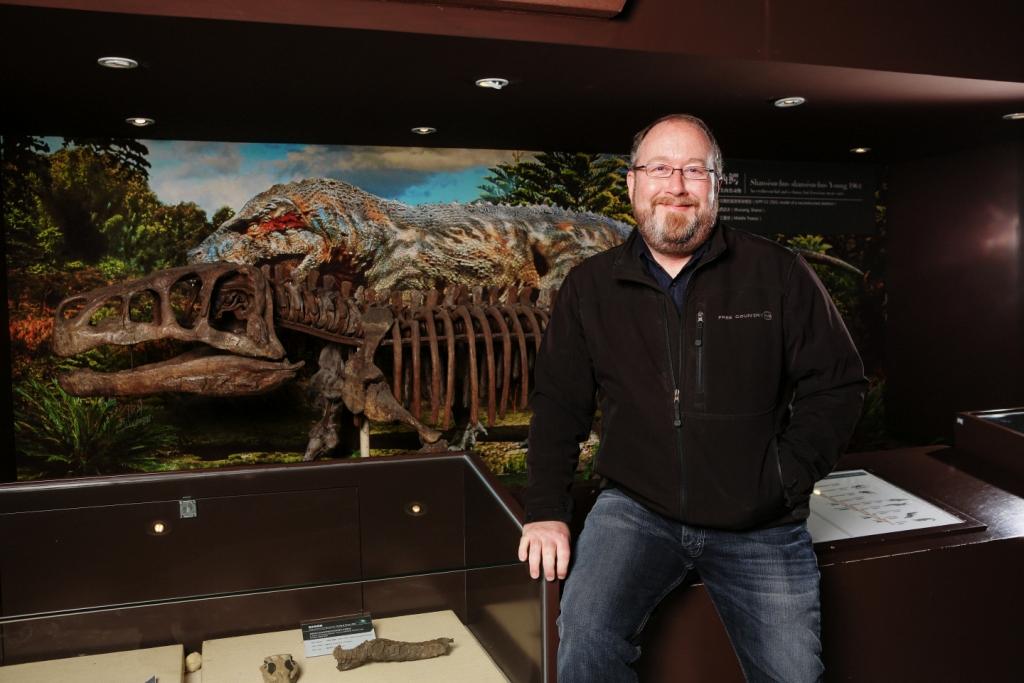
What’s it like to be a paleontologist?
The answer I give about what I do for a living depends on the person or audience I’m talking to. In short, I’m a scientist. However, I can be called an integrative biologist, vertebrate paleontologist, evolutionary biologist, ornithologist, anatomist, zooarcheologist, and sometimes even an entomologist.
Mostly, my research involves studying the evolution of the living groups of birds (including all of the nearly 10,000 living species of birds and all of their extinct ancestors) from their origin more than 66 million years ago to the present day. Although I focus on birds, I’ve also published papers on mammals, dinosaurs, insects, and plants, as well as teach graduate school classes and mentor and train graduate students in their research.
I enjoy my work a lot. I interact with people from around the world, travel a lot for work, get to visit remote and beautiful places and discover things that no one has ever known before. The combination of work in the laboratory and field settings means that it is hard to get bored doing research. I also enjoy teaching and interacting with students.
What does it involve in terms of daily tasks, resources, or people interacted with?
This will probably shock most people, but a large amount of time in a scientist’s workday is spent in front of a computer writing up our research results for publication. All of the discoveries, reports, and announcements that come to into the public eye are all the result of both research, but also writing. Without writing up the research, no one would ever know the results. The research itself can take years to finalize and the process of publishing can take over a year, even after the paper is written. It’s a long slow process.
The main resources for my research are the fossils and modern skeletons of birds. Almost as important to my work is web access to scientific journals and a good library. In addition to the other paleontologists, staff, and students in my institute and elsewhere in the world, I also collaborate with scientists working in different areas of science.
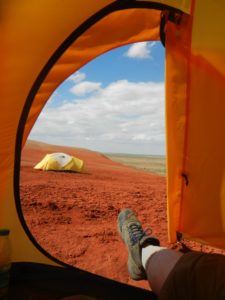
Living in tents usually happens when Stidham goes on a “fossil run”
What are some of the interesting projects you have undertaken on this subject?
Before I moved to China, I spent several years working on fossil birds from South Africa. I was focused on fossil birds from caves and other sites that have produced early fossil humans. I did fieldwork in the Freestate (South Africa) with other paleontologists and paleoanthropologists from America, Canada, and South Africa. We collected a large number of fossils and trained many students in fieldwork. It was freezing work since we were there during the southern winter (our summer). I spent my free time during those trips going to national parks to see birds and other wildlife and enjoying the culture and food of South Africa. I have a lot of friends there and am a fan of the South African national rugby team.
In China, I have dug up dinosaur bones in Inner Mongolia, and I have done fieldwork in rural Shanxi and remote parts of Xinjiang. I love doing fieldwork all over the world. It can be too hot, too cold, or too wet, with food that is not so good, sleeping in a tent for weeks, and very dirty work. However, the excitement of finding new fossils, fossil sites, being with good friends, seeing fantastic sunrises and sunsets with skies full of stars, and seeing amazing wildlife is worth all of those hardships that would keep most people at home.
What are some of the most memorable/unforgettable experiences associated with your subject?
There is always a thrill discovering a new species or figuring out the solution to a hard or complex question that may have taken years to study. Learning something that no one else in the world knows is special.
My work is all an adventure around the world and through time. It is the constant discovery of new species, new records of fossils, and my passion for fossils that motivates me and keeps my interest in work, even when I seem to be chained to my desk for days revising student manuscripts, or my own work. In China, there are always new fossils to study, and I keep working on birds from other countries. I’m sure there will be many more exotic places to visit and thousands of more fossil localities to explore in my future.
What are some of the interesting places you have been to associate with your subject?
I have collected fossils for various museums in South America, North America, Africa, and Asia, and have visited many more museums and universities for research. Paleontology and ornithology can be done anywhere in the world. Every country has birds and fossils, and to be an effective scientist, I have to travel around the world not only to help collect new fossils but also to study the bones and skeletons of birds from everywhere. Birds and scientific exploration do not know national borders. For example, I need to go to Sweden and England sometime soon to look at some bird skeletons and several fossils that were collected in China and India about 100 years ago.
Fieldwork also takes you to many remote and beautiful places around the world. I have found fossils in the foothills of the Andes Mountains in Argentina, collected fossil aquatic turtles in the desert in Xinjiang Province, discovered extinct elephant teeth in the grasslands of South Africa, and excavated giant dinosaur bones in the desert and mountain regions of the western United States.
Not only are the fossils global, but the meetings and professional conferences focused on evolution, birds, and fossils are distributed internationally. I have given presentations at conferences in seven countries on four continents, and I will be presenting at a paleontology meeting in Canada later this year. There is a lot of travel for my work, inside and outside of China.
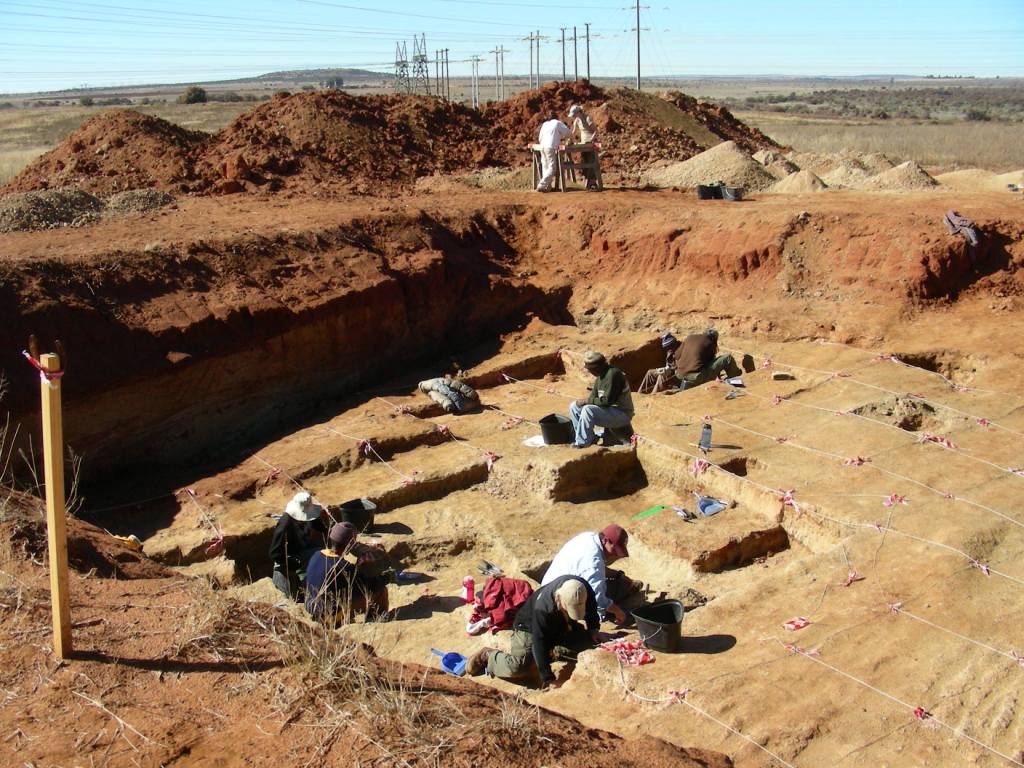
How has this subject changed your perspective on life?
My work is my life, but not in a bad way. I enjoy what I do. So I look for birds wherever I go, hoping to see a species that I have never seen before. I routinely watch the crows on the building across the street from my office. I’m always checking the rocks I see for fossils when I’m traveling around the world or even in Beijing. I enjoy being outdoors and hiking when I have time. I’m always exploring, in search of a new find. However, science isn’t everything in my life, and I enjoy visiting art galleries, making my own art, seeing live music, and experiencing a wide variety of cultural events.
Knowing more about the very long history (millions of years) of Earth and life changes how you see the world and our place in it. You don’t see the world just as it is today, but also what it has been. It also makes you realize that the damage that we are doing to the Earth now (with species extinction, climate change, and habitat destruction) is on the same level as some of the biggest extinction events and other environmental changes in the entire history of the Earth.
Working with people from around the world and traveling widely results in a change in worldview since I collaborate and interact with people from different backgrounds and cultures every day. You have to be flexible and patient, and must be able to look at problems from many different angles. At the same time, you have to be logical and rational in your thinking and to be able to sort out fact from fantasy.
How did you come to the point that you can do this subject? What knowledge, skills, or experiences would be necessary?
To do what I do requires a lot of education, training, and perseverance. I got my first dinosaur book when I was four years old and started to pick up small fossils in the gravel of the school playground when I was five or six. My father is a professional engineer and an amateur scientist. Growing up, I was his assistant in his fieldwork collecting insects. My father and I have since published several papers on insects, including several new species that we discovered together. As an undergraduate, I majored in geology but took several biology classes as well. During college, I worked as a research assistant for different professors, including the summers, and was trained in various lab skills related to collecting, preparing, and studying fossils. I also volunteered as a helper in the fossil collections of the university. I spent two years doing research on my undergraduate thesis project on the complex geology of the rocks and fossils preserved within a collapsed extinct volcano. That was all before I graduated from college and in addition to my classwork.
I began my research emphasis on birds in graduate school. During the work for my Ph.D. in integrative biology, I read very broadly (in the biology library almost every day) and interacted with students and faculty doing a variety of research across the life sciences and geology. After getting my Ph.D., I obtained a postdoctoral position and began working on fossil birds from Africa.
In science, you never stop learning, and I have to read a lot to keep up with what all of the other scientists in the world are doing. Science overall is more interdisciplinary than it was even 20 years ago. In order to do my job and scientific research, there are a wide variety of skills and knowledge that I need. Since I am interested in the evolution of birds, I go bird watching when I can. I have seen nearly 2,000 species of birds in the wild. Since I mostly work on fossil birds, I have to be an expert on the anatomy and osteology of birds. I have dissected many species of birds, and have studied and measured bones from thousands of skeletons of birds from around the world. Paleontologists also travel the world to collect fossils and need to have a variety of skills for conducting fieldwork. We need to know about geology, where to collect and look for fossils, how to collect the fossils (keeping all relevant data from the field) and to preserve them in a way that they survive the trip back to the lab/collections. It’s a dirty, dusty work, but for many paleontologists it’s the part we enjoy the most, discovering something brand new and getting out of the office.
What’s your family/friends’ reaction when you first decided to take this subject? And now?
Growing up, my parents always knew I wanted to be a scientist, and they certainly facilitated that by buying me science books, taking me to museums, and encouraging my curiosity. For career day in elementary school, I borrowed my dad’s lab coat and safety glasses and went as a scientist. My dad shared his interests in all aspects of science with me since I was a child. When I went to college though, my parents wanted me to be an engineer and to treat my interest in science as a hobby. That way they hoped I would have a steady career. After taking my first geology class in my freshman year of college, I changed my major to geology (from engineering). When that happened, my mother said that they expected that I might do that because they knew how interested I was in fossils my whole life.
Now many years later, I have published nearly 60 papers in a wide variety of journals, have worked on research projects around the world, have taught thousands of students who have gone on to become scientists and doctors, have had my research reported on by press outlets all over the world, and also have that steady career that my parents hoped for (but in a completely different field and country). My parents and friends who have known me a long time (before college) all know that my life now is what my interests and my motivation have always led me to become. However, not all paleontologists follow that path, and I have many colleagues who discovered paleontology in college.
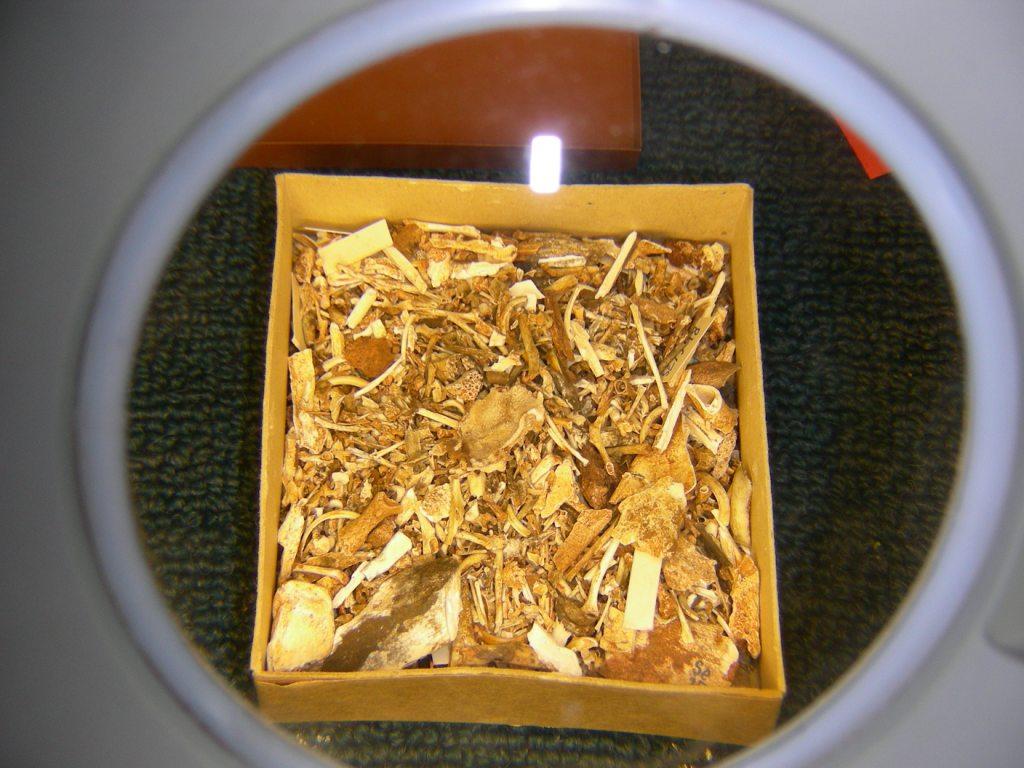
A box of fossil bird bones Stidham collected in one of his expeditions.
What do you think to be the essence of this subject and why should people study or work on it?
In essence, I think what I am doing is striving to understand the world we live in better and to uncover the history of our planet. Every plant, every bird, and every rock has a story and a history.
For me, studying fossils, birds, and other aspects of biology is just fascinating. My curiosity drives me. We do not know everything about our planet or the universe. We don’t know all of the species of birds on Earth or even all of the species of organisms that occur in Beijing. There are far more living and extinct species of other groups of organisms yet to be found across the globe.
From a practical standpoint, the data that I am gathering on birds relates to how climatic and environmental factors have affected the evolution and extinction of birds throughout their history. What factors (cooling or warming climate) led to extinction, the movement of bird species from one continent to another, and the rapid evolution of new species? The answers to those questions are important in the face of habitat destruction and climate change (global warming) around the world today. If we are going to be able to plan for the future and save the species living on the Earth and entire ecosystems, we must understand what has happened in the past when the environment changed and when the Earth rapidly warmed before. The past gives us a window into the future in a changing world.
This information is important for different reasons other than just scientific curiosity. One example is that birds carry diseases like avian flu. Having an idea of where birds will occur in the future and knowing the likelihood that they’ll move from one continent to another can change how we plan for the spread of diseases carried by birds (and other organisms). Many of our medicines were first found in plants, animals, and other organisms. As we lose species to extinction, we lose the potential to find new chemicals and products to fight diseases. These questions don’t just interest scientists but will have an impact on society.
However, don’t expect to get rich being a paleontologist or evolutionary biologist. One of my college professors told me something that is very true about this area of science. He said, “Don’t do paleontology unless it is what you have to do with your life.” It is very hard work, it is not a 9 to 5 kind of job, and there are many obstacles to being successful. Research scientists are generally paid less than professors, and even professors are not wealthy. While there are easier paths in life, I would not trade the colleagues and friends that I have around the world, the memories of gorgeous sunsets seen from the opening of a camping tent, or the thrills of the discovery of new species for a comfortable job sitting in an office with only two weeks a year for travel.
Photos: Courtesy of Thomas Stidham

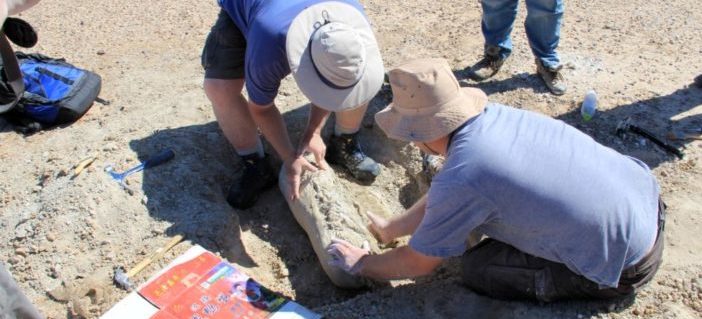
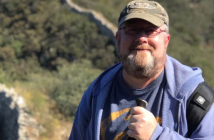
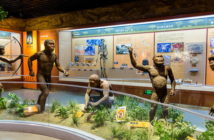
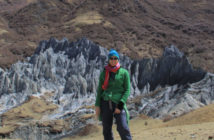
1 Comment
This post is worth everyone’s attention. How can I find out more?